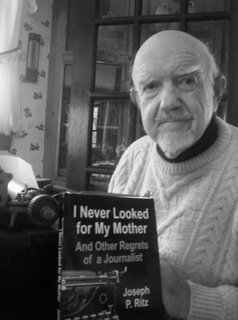Author: JOSEPH P. RITZ

Author’s website: http://www.jritz.net.
Books in Print: The Despired Poor, I Never Looked for My Mother
Welcome Jospeh,
1. WHEN AND WHY DID YOU BEGIN WRITING?
When I was seven my foster mother, wanting to take a nap after a long walk with me in the woods, told me to write about what we had done and when she woke up praised me greatly for what I had written, showed it to my second grade teacher and kept it for many years. It was then I learned that one could get welcome praise for writing. Something we all wish for, even when we don’t admit it. Later on, in grade school I entertained my fellow pupils with my stories written in response to English assignments. They were murder mysteries. I hit on a formula that’s been successful in Hollywood — lots of violence and when the story began to drag, a murder or two. My plots were strong, but my endings were weak because: 1 - I had no idea how a story would end when I began it. 2 - By the time I got to the last page, I had killed off all my characters without resolving the mystery.
Nevertheless, my stories were a hit among my young classmates, more interested in the murders than the plot’s resolution. On rare occasions in English class they asked my teachers to let me read my bloody tales. It gave me recognition I craved.
My first writing to be published in a daily newspaper took place when I was in the army and The Tacoma Tribune printed a long article I had written about army ski training in the nearby Cascades. However, I was not paid and there was talk of court-martialing me.
2. WHAT INSPIRED YOU TO WRITE YOUR FIRST BOOK?
My first book, The Despised P oor (Beacon Press) grew out of a national welfare controversy I was covering for a Gannet Group newspaper in Newburgh which was receiving national coverage. The book was praised by The New York Times and several other newspapers and by a few national magazines. It also got me on national television, but it sold only a couple of thousand copies. It is still being quoted, I am told, by sociologists and political scientists. In fact I have been invited to give a speech about the subject in September.
3. HOW DID YOU APPROACH WRITING YOUR FIRST BOOK?
That was in the 1960s when major publishers were still open to being approached by unknown writers. I wrote several major publishers with an outline of what I planned to research and write and was invited to lunch by an editor from Harper & Row. She told me what research was needed and asked me to write the first three chapters. After I did, she said she liked what I did but it had been decided that the subject would be of little interest to the public by the time the book was published.I wrote the book anyway and then set about the months long project of approaching publishers. At last Beacon Press decided to publish the manuscript.
4. WHO OR WHAT INFLUENCED YOUR WRITING?
I’ve made my living as a journalist which means that I have worked under several editors, a few good, most terrible, with little knowledge of either the subject or good writing. I have read and keep several books about writing, but I have been mostly influenced by reading good writers from Shakespeare to Scott Turow. I also write plays and it was by reading Eugene O’Neill in high school that I decided to be a playwright. Unfortunately, while I have won some national awards, my plays have largely been produced in small theaters before small audiences.
5. WHY DO YOU CONTINUE TO WRITE?
I said it best in my memoir, I Never Looked for My Mother:
I know at this late age (I’m 76) that I will never win a Tony or the National Book Award. I know that I will never have dinner in the White House or have my book or play turned into a movie, or receive an honorary degree from an Ivy League college. And I will never live in a mansion with an Olympic-sized swimming pool. But I still spend the majority of my days writing. You know why so many old men died when soldiers overran the Indian villages in the old days? It wasn’t because they couldn’t run away. They stayed for the honor of dying while they fought their enemies. It’s tempting to say that I write to make the world better, but that would be like trying to stop the earth’s rotation by sticking my hand into the wind. I write knowing that I will fail and that my idea of good is not everybody’s and perhaps even not shared by whoever my readers are. But I find pleasure in the argument. Writing is my conversation with the world. It has been so since my foster mother, wanting rest and quiet, sent me to my room to write an essay on what I had done that weekend.
6. WHAT DO YOU HOPE TO ACCOMPLISH THROUGH YOUR WRITING?
See Above.
7. WHAT HAS BEEN YOUR EXPERIENCE AS A PUBLISHED WRITER?
I’ve become aware that people seldom read bylines, or remember them, so the writer remains unknown to most readers.
8. HOW DO YOU PROMOTE YOUR BOOK?
By doing book signings, radio interviews, trying to interest newspapers to do reviews (very difficult these days for a POD book), creating a web site.
9. ADVICE TO OTHER WRITERS:
Don’t plan on getting great wealth, do it because you feel you must. If you don’t, plant a garden, spend more time with your children.
Thank you, Joseph.
Interview by Kaye Trout - June 7, 2006 - Copyright

<< Home